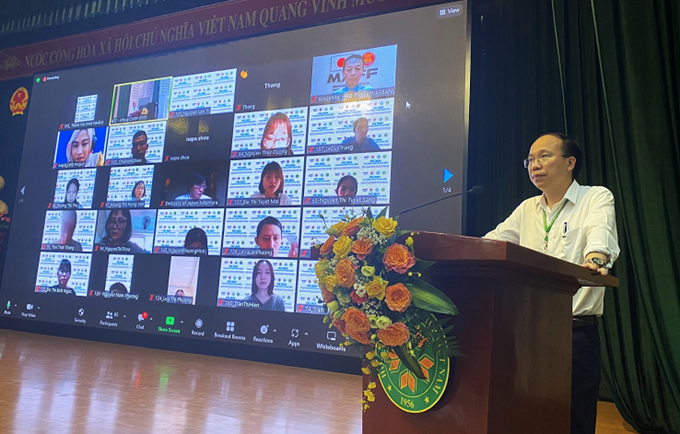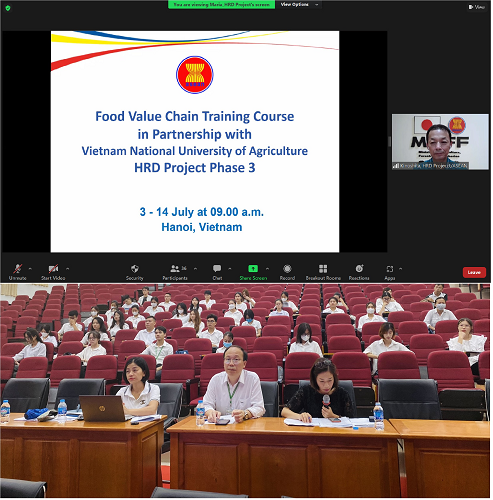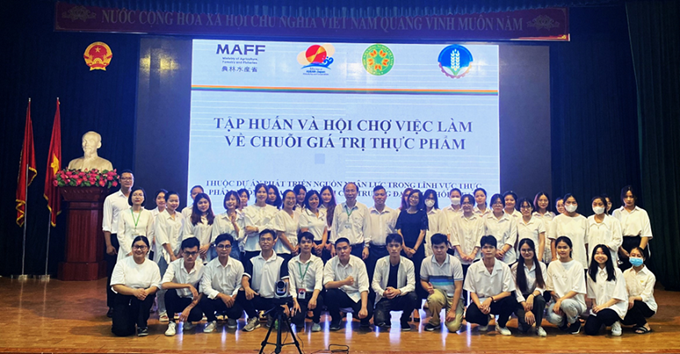The short-term training support project of the Japanese Ministry of Agriculture, Forestry and Fisheries through coordination of the ASEAN Secretariat on the value chain of agricultural products and food was an important contribution to promote the export potential of agricultural products, Vietnamese food products to international markets, contributing to the enhancement of added value and sustainable development of Vietnam's agricultural industry.
Promoting the export of agricultural products was one of the important policies in the process of agricultural restructuring towards increasing added value and sustainable development. In recent years, the export value of Vietnam's agricultural products had reached a high level, contributing a significant part to the total export value of goods and GDP of Vietnam. Up to now, Vietnamese agricultural products had been exported to 180 countries and territories around the world, with the aim to reach 54-55 billion USD by 2023.
However, if the goal was to deeply participate in these special markets, it was very important to develop products along the value chain, helping businesses ensure traceability, quality standards and food safety and improve product value. Improving the food value chain was not only a problem of Vietnam but also of the world; even in developed countries, it had to be constantly improved.
Therefore, strengthening training and updating new knowledge on food value chains for stakeholders was very essential for Vietnam's agriculture and food industry, especially opportunities to learn from the successful experience of Japan, one of the world's leading countries in creating high added value for agricultural products.
Within the framework of the Project of Resource Development for Food-related Sectors through ASEAN Partner Universities (HRD Project) in cooperation with Japan, on the morning of July 3, 2023, the opening ceremony of the 2023 Food Value Chain training course was held at Vietnam National University of Agriculture (VNUA) and connected with Japanese bridgeheads as well as students in different provinces via Zoom platform.
Participating in the opening ceremony, representing the Japanese side were Mr. Naoki Mitamura, First Secretary, Embassy of Japan; Mr. Hiroaki Kinoshita, HRD Project Coordinator; Mr. Zhou Xuan, Chief Consultant, NOMURA Agricultural Planning and Consulting Co., Ltd; with the participation of the representative of the ASEAN Secretariat, Ms. Maria Octora.
On behalf of VNUA, there were Assoc. Prof. Dr. Nguyen Hoang Anh, Dean of the Faculty of Food Technology, and lecturers from the Faculty of Food Technology. In the opening speech, Assoc. Prof. Dr. Nguyen Hoang Anh gave a brief introduction about the project's formation and operation, especially the annual Food Value Chain training course. Following the program, Mr. Naoki Mitamura, First Secretary of the Embassy of Japan in Vietnam, Japan, raised the importance of building a food value chain in agricultural development. He also hoped that through this project and training course, he could share Japan's experiences in agricultural development with Vietnam, on that basis, expand cooperation in the fields of agriculture and food between two countries. Finally, Mr. Hiroaki Kinoshita, HRD Project Coordinator on the Japanese side of the ASEAN Secretariat, shared about the project's objectives as well as the results of the courses that the project had carried out in recent years from 2015 to 2022. Before the course officially started, Mr. Hiroaki Kinoshita briefly introduced the topics, contents and activities that would take place in the 2023 Food Value Chain training course.
Within the framework of this training course, there were 10 topics introduced by speakers from the Japanese Ministry of Agriculture, Forestry and Fisheries and Japanese food manufacturing and trading organizations and enterprises, including:
1. Sustainable food and agriculture management
2. Cooperatives and joint ventures in agriculture
3. Information and communication technology in agriculture
4. Development of functional foods
5. International trade in agriculture and food
6. Global logistics and food supply chain
7. Food processing technology (dairy products)
8. Restaurant industry and sustainable agricultural development
9. Using robots in the food service industry
10. Freezing technology in the food supply chain
Along with the theoretical lessons, there were six discussions and presentations on five topics related to the course and a study tour at Nutricare Nutrition Joint Stock Company for 45 students.
After the course, through the lessons learned and by approaching new Japanese advances, the participants would better understand the food value chain as well as have more information and ideas to renovate and improve economic efficiency of the food value chains in Vietnam.
Some photos from the opening ceremony of the training course

Assoc. Dr. Nguyen Hoang Anh delivers the opening speech of the 2023 Food value chain training course

The opening ceremony of the 2023 Food Value Chain training course held online and in-person at VNUA

Representatives of the Organizing Committee and students' representatives at the opening ceremony of the training course